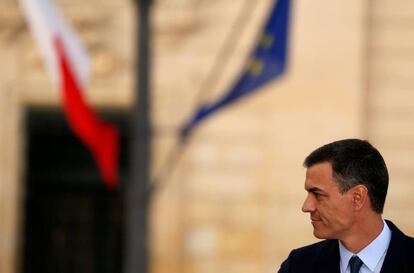City Hall deal complicates Pedro Sánchez’s bid to stay in power
The acting prime minister may lose the promised abstention of a pro-Catalan independence party, after the Socialists supported incumbent Mayor Ada Colau in Barcelona

If the chances of acting Prime Minister Pedro Sánchez finding the support needed to be voted back into office before the weekend were looking slim, today they are even slimmer.
Saturday saw a number of mayors sworn in across Spain – including in Madrid and Barcelona – after local elections were held on May 26. Many of the results of those polls were inconclusive, meaning that parties such as the conservative Popular Party (PP), Socialist Party (PSOE), left-wing Podemos, center-right Ciudadanos and far-right Vox have been engaged in talks to do governing deals.
Now that the local political map has been defined, negotiations between Spain’s main political parties will begin once more
The situation is the same on the regional level, with a number of governments yet to be defined due to inconclusive results. And on the national level, of course, there was no clear winner at the April 28 general election, with Sánchez – who won the most votes, but fell short of a majority – needing the support or abstention of a number of groups if he is to be voted back in as prime minister in Congress.
Ahead of the weekend, the Catalan Republican Left (ERC) appeared willing to abstain in the second round of an investiture vote in Congress, at which just a simple majority – more yes votes than no – would be needed for Sánchez to hang on to power. Sánchez already counts on the support of left-wing Unidas-Podemos, as well as a number of smaller groups in the lower house of parliament.
But the decision of the Catalan Socialist Party (PSC) to support the incumbent mayor of Barcelona Ada Colau, instead of the ERC’s Ernest Maragall, has irritated the pro-independence party. The latter candidate won more votes than Colau at the May 26 polls, but the pair ended up tied with 10 seats each in City Hall. Colau was voted back into power thanks to the support of her own party, Barcelona en Comú, the PSC and three votes from the group led by former French Prime Minister Manuel Valls. Lawmakers from Ciudadanos abstained.
Should the ERC go back on its commitment to abstain, Spain could be facing yet another general election
Now that the local political map has been defined, negotiations between Spain’s main political parties will begin once more, in order to reach deals over the regional governments that are still up for grabs. The PSOE, however, has little faith that it will manage to govern in some of the areas where it won the most votes. This was the situation seen earlier this year in Andalusia, where the PSOE was ousted from power after 36 years, despite having won the most votes at the December elections. A government was formed by the PP and Ciudadanos, with the support of Vox.
By the end of this week, the regional deals should be done, and only then will the leadership of the PSOE embark on the negotiations to see Sánchez voted back into power.
Should the ERC go back on its commitment to abstain, Spain could be facing yet another general election – the fourth in under four years. On Sunday, the ERC did not appear to be in the mood to do Sánchez any favors. The reelection of Colau as mayor of Barcelona, to the detriment of the ERC candidate, was met with protests by supporters of independence on Saturday, with insults and even objects thrown at Colau and the Socialists in the street. The ugly scenes reflected the hostility toward the PSC, and, by extension, the PSOE of Pedro Sánchez.
The “Navarre route”
The PSOE is still, however, holding out hopes for the so-called “Navarre route.” The northern region was won by Navarra Suma, a group made up of the conservative Navarrese People’s Union (UPN), the PP and Ciudadanos. But it also lacked a majority, and is calling on the PSOE to help it form a government. If Sánchez can persuade the Navarre branch of his party to facilitate such a move, he may be repaid with the two votes that UPN has in Congress, thus meaning the support of the pro-Catalan independence ERC is no longer necessary for him to be voted in as prime minister once more.
English version by Simon Hunter.
Tu suscripción se está usando en otro dispositivo
¿Quieres añadir otro usuario a tu suscripción?
Si continúas leyendo en este dispositivo, no se podrá leer en el otro.
FlechaTu suscripción se está usando en otro dispositivo y solo puedes acceder a EL PAÍS desde un dispositivo a la vez.
Si quieres compartir tu cuenta, cambia tu suscripción a la modalidad Premium, así podrás añadir otro usuario. Cada uno accederá con su propia cuenta de email, lo que os permitirá personalizar vuestra experiencia en EL PAÍS.
¿Tienes una suscripción de empresa? Accede aquí para contratar más cuentas.
En el caso de no saber quién está usando tu cuenta, te recomendamos cambiar tu contraseña aquí.
Si decides continuar compartiendo tu cuenta, este mensaje se mostrará en tu dispositivo y en el de la otra persona que está usando tu cuenta de forma indefinida, afectando a tu experiencia de lectura. Puedes consultar aquí los términos y condiciones de la suscripción digital.








































